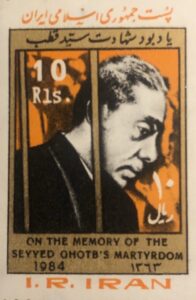
Sayyid Qutb’s ideas profoundly impacted Muslim communities around the world. He should be counted as one of the most important and influential leaders of the twentieth century.
Excerpt from The Paradise Paradox
Sayyid Quṭb’s diagnoses of the world’s ills and his prescribed cure impacted the lives of hundreds of millions. World history from 1970 would be unrecognizable to us if this man had not written what he did; his influence has only grown with each successive decade since Egypt executed him 1966.
Quṭb lived for a time in the United States, leading him to judge the condition of global humanity to be at a breaking point: humans lived in abject alienation from their natural, God-given state, and all lived in bestial degeneracy, as evidenced by unbounded sexual licentiousness, alcoholism, and drug addiction. All were symptomatic of existential bankruptcy, and in his view, it was this rot that the Western powers sought to impose on the Islamic heartland. As it blazed the trail on this headlong drive into depraved ignorance, the Christian West’s “treacherous orientalists” utilized the “evil designs” of “world Jewry” to suck the Muslim world into its folly. Two aspects of this “trickery” are worth our notice, as they shed light on the logic of militant Islam.
Shopping-cart religion
First, Quṭb deplored the West’s idea that religion is a set of optional personal convictions, “merely a name for ‘belief’ in the heart,” he scoffed. Muslim scholars living in the West, the cherished moderates, “with their defeated mentality,” bore Quṭb’s judgment for having adopted this shopping- cart style “Western concept of ‘religion.'”
No, he said. The truth is not a matter of opinion or personal conviction. “Islam is not merely a belief… Islam is the way of life ordained by Allah Almighty for all mankind, and this way establishes the Lordship of Allah alone.” For Quṭb and his millions of followers, religion is not a choice but a detailed system for living, handed to us from God as a finished corpus in toto, which applies to everyone whether they believe in God or not. This is particularly prickly with Islam, because this true religion, as Quṭb writes, is the “Haakimiyah (sovereignty or kingdom) of Allah—and orders practical life in all its daily details.”
Jihad
Moreover, argues Quṭb, this head-to-toe monopoly on belief “throws a completely new light on the Islamic Jihad.” Westernized Muslim scholars wrongly “conceive of religious war as a war to impose belief on peoples’ hearts.” Not so, says Quṭb. It has nothing to do with beliefs; therefore, “Jihad in Islam is simply a name for striving to make this system of life dominant in the world.”
Note that the key words are “system” and “dominant.” Jihad is not a moral argument—it is law enforcement. In the early days of Islam, writes Quṭb, “Jihad bis-Saif (striving through fighting with the sword)… was a movement to wipe out tyranny and to introduce true freedom to mankind.” Quṭb thus taught that jihad’s aim to make Islam the “dominant system in the world” was an act of liberation. “Only in this manner can the way of life be wholly dedicated to Allah, so that neither any human authority nor the question of servitude remains.” In other words, true freedom only occurs in total submission to Islam; everything else is subjection to mere human ideas.
Good riddance
For Quṭb and the Muslim Brothers, the first order of business was to rid themselves of the Westernized Arab elites. They would replace them with genuine Islamic states based on Islamic law. Then the overarching universality of God’s sovereignty would supersede local secular nationalism. Because it is transnational, this superseding authority also applies to all Muslims wherever they live, even if they are citizens of the Western nations: “Other societies do not give it [Islam] any opportunity to organize its followers according to its own method, and hence it is the duty of Islam to annihilate all such systems, as they are obstacles in the way of universal freedom.” Please pay attention to what he says—namely, that the duty of Islam is to annihilate other systems.
Quṭb and the Brotherhood’s founders inspired generation after genera- tion. We’ve seen it in their powerful presence in the Arab Spring and their ascendency to power in Egypt. We see them also in the outlook of Hamas, in Egypt’s Islamic Jihad, in Turkey’s longest ruling party, and in Islamists in Syria and North Africa. We see the same ideas in extreme offshoots like al- Qaeda and the Islamic State—all these various Islamist movements are founded upon precepts cultivated by the Brotherhood. Even Iran’s Ayatollah Khomeini, although a Shiite, admitted to the influence of Muslim Brother- hood ideas. Iran openly honors Quṭb in particular.